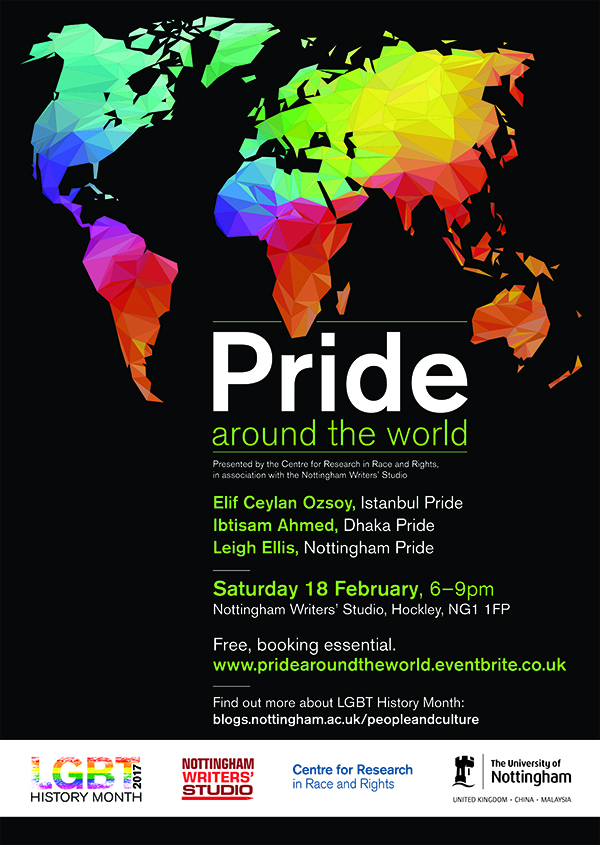
March 6, 2017, by Claire Henson
Celebrating Pride around the World
Ibtisam Ahmed, Doctoral Research student in the School of Politics & IR and Project Director for the C3R LGBT History Month, talks about one of the events.
On 18 February, the Nottingham Writers’ Studio played host to one of the many events that the University of Nottingham has organised as part of 2017 LGBT History Month. In a panel discussion on “Pride around the World”, organisers and participants from three distinctly different Pride celebrations came together to share experiences, express solidarity, discuss the rich history of the institution, and talk about the limitless potential of its future.
Leigh Ellis and Craig Martin spoke on behalf of Nottinghamshire Pride. They shared some interesting points about its past, including how it used to be a commercialised garden party until companies stopped their sponsorship, before making an excellent statement about its current direction. Organised now as a grassroots march – “Not a parade”, as Mr. Ellis put it – that focuses on the actual community itself, it has already achieved a stronger socio-political slant in its renewed form. In 2016, it made history by becoming the first grassroots UK Pride to be led by a queer group of colour, QTIPOC Notts. At the same time, it includes a range of performance spaces and after-parties to highlight LGBT talent and businesses. Although it is definitely celebratory due to the successes of the LGBT movement in the UK, it was heartening to hear talk of a Pride that avoids commercialised tourism in favour of connecting with its true revolutionary roots.
The presentation on Istanbul Pride, delivered by Elif Ceylan Ozsoy, continued with the revolutionary aspect of Pride. Unlike the UK, where LGBT rights and their open discussion are now legally protected and largely socially accepted, Turkey has a complex situation where rights are entrenched in the legal system but are not provided in practice. Ms. Ozsoy talked about the recent police brutality against organisers of various Pride events across Turkey and juxtaposed that with the extreme importance of continuing to host the event in the country. Specifically, Turkey is the one country in the region that both protects LGBT rights and also allows visa-free travel from neighbouring Middle East nations. This means that LGBT groups from Syria, Iraq and Jordan, among others, use Istanbul Pride as a sort of regional celebration of their identities as well as a legal platform of protest. Ms. Ozsoy also spoke about the new method of dispersing that is employed by the Istanbul organisers, wherein the Pride event is no longer centralised on a march that can be attacked and harassed, but spread across the city in pockets of smaller, more manageable acts of resistance.
This theme of resistance is something I touched on when I spoke about Dhaka Pride. In a different status yet again, Bangladesh neither legally recognises nor socially accepts matters of sexuality. Interestingly, however, transgender identities, as part of the wider Hijra third gender community, are legally protected and are seeing growing social understanding. In this climate, Dhaka hosts two Pride events. Hijra Pride aims to be a space of both celebration and education, with Hijra activists leading a procession of artists and performers to talk about their experiences. The Rainbow March, now discontinued due to security concerns, focuses more on different sexualities and used to one of the many processions that took place on the day of Bengali New Year. In both cases, the organises centre local narratives and voices, intertwining celebrations like New Year and focusing on traditional performances and costumes to highlight the existence of queer identities in the region in a more organic and traditionalist way.
A common thread running through all three presentations and the subsequent Q&A session was in the importance of Pride as a space to highlight LGBT identities. In an age where queer spaces are dying out, either through assimilation or through suppression, and where commercial aspects such as corporate sponsorship are becoming the norm for bigger Pride events, it was important to focus on events that are still aimed at magnifying local queer voices. By putting the spotlight on specific contextual needs, these particular Prides are speaking more authentically to the spirit of an institution that started as a protest, not as a party.
No comments yet, fill out a comment to be the first

Leave a Reply